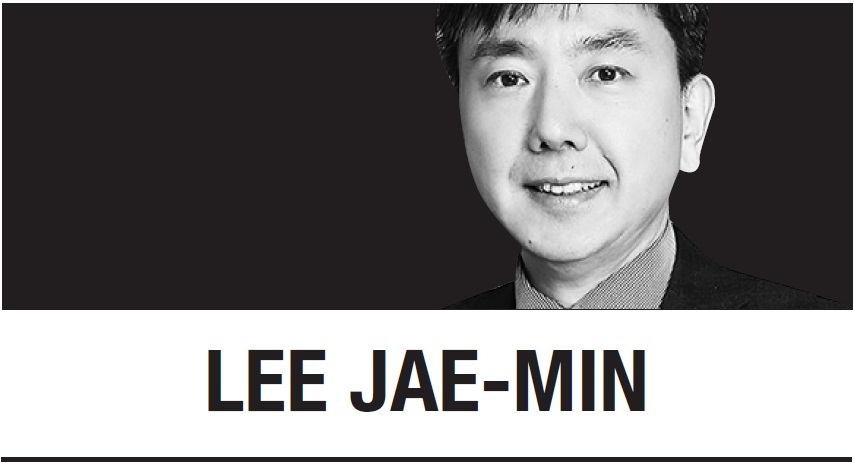[Lee Jae-min] Debates, sufficient deliberations key to legislative process
By Lee Jae-minPublished : March 19, 2019 - 17:02
 Usually, society changes first. Laws then follow. Which means a gap between the two. The norm-reality gap has become more evident these days: the speed of social changes is unprecedented, and laws are lagging behind, panting.
Usually, society changes first. Laws then follow. Which means a gap between the two. The norm-reality gap has become more evident these days: the speed of social changes is unprecedented, and laws are lagging behind, panting. The narrower the gap, the more likely society benefits from harmony and stability. A gap left unattended grows into a gulf, fostering social discord and instability. It all depends on the quality of the legislative institution. The legislature fails us either by over-regulation, under-regulation or sometimes no regulation. Finding the right balance at the right time helps the society move forward. Otherwise, the legislature becomes a stumbling block.
Well, we know the track record of our National Assembly is far from optimal. Important legislations are being held up amid political bickering. Key bills are withering on the vine. Sadly, all this is happening while the society is changing at lightning speed.
Sometimes quite the opposite happens for certain enactments: hastily processed for political motives or as proof of something being done, before the consequences are fully understood and digested.
That said, we also find instances where the National Assembly carries out the legislative task in a way that is responsive to new social controversies, in an effort to find common ground. New legislative endeavors then put an end to long-lasting controversies, or at least are able to manage them reasonably.
A common thread for these “responsive” or “gap-narrowing” legislations is thorough debates and sufficient deliberations. Even better if detached from partisan politics. Here, the National Assembly listens to competing views, consults experts, holds conferences, studies examples of other countries, and then seeks the least common denominator.
Consider, for example, the legislation that has just passed its first anniversary -- euphemistically called “well-dying law” instead of its long, official title.
The law permits, under strict conditions and with proper consent, patients and their family members to refuse life-sustaining treatment for enumerated incurable diseases during the terminal stage. It came into effect in February 2018, and one year on, philosophical, ethical and legal debates are still continuing. They will probably never end given the fundamental nature of the issues involved.
Contents of the act aside, its enactment process chronicles the history of debates and deliberations at many different levels spanning over two decades. Experts’ views and professional opinions have been solicited and juxtaposed. At the core was the direct clash between two values: deeply rooted Confucian culture in the country versus changing society and medical technologies. In the clash, family-hospital disputes, medical staff indictments and intra-family disagreement ensued.
There is no right or wrong answer to this fundamental question. But the deep social contemplation with proper inputs has at least produced a legislation that is responsive to long-lasting social controversies.
Check the statistics from the Ministry of Health and Welfare. Since its enactment to February this year, prior consents submitted by ordinary citizens under the act reached 115,259. In the same 12 months, 36,224 treatment-suspension applications were made at hospitals. This accounts for 12.1 percent of total deaths in 2018.
The first year statistics indicate that the new legislative framework offers guidance for the society and families for this difficult subject. Again, we’ll have to see how ongoing debates on this very fundamental issue will evolve in our society.
Experience tells us the importance of debates and deliberations for a legislative process. Different aspects and diverse views should be kept in sobering perspective and in mature contemplation. For a controversial issue, this is critical.
Certainly, sometimes exigent circumstances demand quick action. Think about the fine dust legislation that passed the National Assembly last week. Time is of essence here. Even so, full debates are still indispensable, even conducted in an intense and condensed manner.
Unfortunately, we often observe debates and deliberations to be replaced with intense confrontation among interest groups. Legislative projects are used for political gains. These laws, even when enacted, hardly address a social problem. They may only exacerbate it.
Lee Jae-min
Lee Jae-min is a professor of law at Seoul National University. He can be reached at jaemin@snu.ac.kr. -- Ed.

















![[KH Explains] Hyundai's full hybrid edge to pay off amid slow transition to pure EVs](http://res.heraldm.com/phpwas/restmb_idxmake.php?idx=652&simg=/content/image/2024/04/18/20240418050645_0.jpg&u=20240419100350)

![[Today’s K-pop] Zico drops snippet of collaboration with Jennie](http://res.heraldm.com/phpwas/restmb_idxmake.php?idx=642&simg=/content/image/2024/04/18/20240418050702_0.jpg&u=)